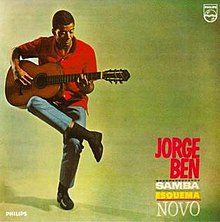Release and reception
By the time of the album's release, newspaper O Estado de S. Paulo believed it would soon disappear from the stores, just like his previous 78 RPM releases. [3]
In 2007, it was listed by Rolling Stone Brazil as one of the 100 best Brazilian albums in history. [4] American critic Rodney Taylor wrote of the album: "His first album, which translates to 'New Style Samba,' sets out his ambitions. Spritely, percussive guitar anchors the songs, and Ben's smooth/rough voice puts them across. Horns, percussion and strings color the tunes, but never pull the focus from Ben. 'Mas que Nada' ranks as one of the most popular songs in the world." [5] In Los 600 de Latinoamérica, a ranking created by several Latin American music journalists covering the years 1920 to 2022, Samba Esquema Novo was ranked 27th. [6] It was ranked 30th in Discoteca Básica's List of the 500 Greatest Brazilian Records, chosen by 162 Brazilian music experts. [7]
This page is based on this
Wikipedia article Text is available under the
CC BY-SA 4.0 license; additional terms may apply.
Images, videos and audio are available under their respective licenses.
